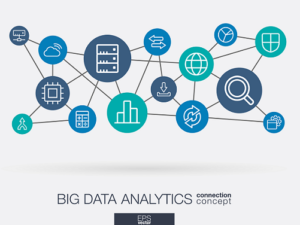Big Data Analysis and Reporting Techniques
Course Overview

To maintain competitiveness in today’s environment, business managers must improve the quality of products/services, facilitate continuous improvement at all stages of production, and make accurate decisions, which are driven by data and research. In the business context, a diversity of data is available for inspection and analytical insight. Enrolling in a data analysis course in Dubai can provide business managers with the essential skills and knowledge to effectively leverage this data for informed decision-making and business success.
In today’s rapidly evolving business landscape, data-driven decision-making has become imperative for organizational success. The Big Data Analysis and Reporting Techniques course offers comprehensive training aimed at equipping business managers in Dubai, Abu Dhabi, and SA with the essential skills and knowledge to leverage data effectively. Through a series of modules, participants will explore various aspects of data analysis and reporting, from understanding different types of data to performing statistical analysis and presenting findings. This course provides a holistic approach to data-driven decision-making, empowering participants to make informed choices and drive business growth.
Goal of Course:
The primary goal of this data analysis course in Dubai, Abu Dhabi, and SA is to empower participants to become proficient in leveraging data for strategic decision-making. By the end of the course, participants will be able to effectively present diverse data types, conduct statistical analysis on market data, and interpret findings accurately. Moreover, participants will develop a deep understanding of statistical techniques and their applications in solving real-world business problems. Through hands-on exercises and practical examples tailored to the business environments, participants will gain the confidence and expertise needed to drive organizational success through data-driven insights.
Duration:
3 Days
Language:
English
Training Objectives
Upon the completion of this course, Participants should be able to:
- Present different types of data in an appropriate manner.
- Perform statistical analysis on market data.
- Present findings of data analysis in a research proposal.
- Identify areas/issues/situations where statistical analysis would be beneficial.
- Collect, analyses and interpret data relevant to their decision-making.
- Identify and interpret trends.
- Use Excel spreadsheet to calculate statistical measures and interpret Excel outputs.
- Understand how to apply relevant statistical techniques to solve the underlying problems/issues.
- Report on statistical findings
Module Outlines
Module 1
- Introduction to Data Analysis & Reporting
- Types of Data
- Data measurements
- Display of data: (frequency tables, use of different charts and graphs)
- Difference between Population of Sample
- Descriptive Statistics – Central Location, Dispersion, Shape of Distribution
Module 2
- Probability – Joint/Additional/Conditional Probability
- Data Collection Methods and Sampling
- Probability Distribution – Binomial/Poisson
Module 3
- Continuous Probability Distributions- Normal Distribution (mean and proportion) and Sampling Distribution, CLT
- Confidence Intervals (population mean and proportion and t-distribution)
- Hypothesis Testing (Problem identification, Defining null and alternative hypotheses
- Error types, Calc and Critical values, level of signification
- Decision rule and testing hypotheses via statistical values and p-values) – on Population parameters such as mean and proportion
Module 4
- Correlation and Simple Regression
- Direction of relationships, Coefficient of Correlation,
- Coefficient of Determination, Sampling error
- Method of least squares
- Intercept and slope coefficients, p-values, line equation for prediction
- Confidence intervals for regression model parameters
Module 5
- Hypothesis Testing – Simple Regression Model Introduction to Multiple regression model (Estimating coefficients)
- Hypothesis testing for Multiple regression model – model parameters and F-test
Customized Learning
Leap To Success is offering a variety of learning options to meet current realities and can be adapted to suit your business needs. These options include variants of online, blended and on-site course formats.
Face To Face Learning
Enabling you to have a face to face interactive and engaging learning experiences led by renowned industry experts and thought leaders with extensive practical experience who will employ a variety of interactive learning techniques, including short high-impact videos, case studies, assessments, role plays, in addition to on-going support.
Virtual Learning Labs
Interactive online learning held in real-time using Zoom and are led by international subject matter experts who incorporate case studies, breakout rooms, guided practice, simulations and discussions to maximise your learning experience.
General Methodology
Similar to any L2S training program, this program offers an interactive learning experience in which will allow the delegates to reflect on their learning through an informative, indulging, and fun classroom experience. The design of the training session focuses on the following attributes.
- Concrete Experience: The delegates will learn by doing
- Reflective Observation: Reflecting on the newly experienced skill-set
- Abstract Conceptualization: Developing deeper understanding to the learned concepts
- Active Experimentation: providing the delegates with realistic tools that can be tested in the real life
Specific Methodology
To effectively execute this program and to ensure that the end result is being achieved L2S specific training methodology in Service Leadership is as explained in the below stages:
Stage 1: Designing the Training Event
A diagnostic meeting is fundamental for conducting the Data Analysis workshop in order to capture the current happening with in the organization and to reflect those happening in the training event.
Stage 2: During the training .
This course is designed for the full involvement of every participant through the use of:
- Theory input
- Skills practice sessions
- Interactive team activities
- Group discussions
Sign Up For the Course
